After the COVID-19 pandemic, the vision of tourism development in Italy for the next few years is focusing on VALUE GROWTH, meaning to be capable of generating economic, social and cultural sustainability. The value of the tourism offers, the value of tourism and local businesses, are of importance of the market.
Creating a model for measuring the sustainable tourism will be essential in order to:
· support the development of innovative products and services while reducing impact on the environment,
· focus on issues related to the conservation of the ecosystem, biodiversity as well as reduction of the impacts of climate change
· promote a sustainable development, as a contribution to the green recovery and to overcome the effects of the crisis in the context of the Covid19 pandemic.
Furthermore, before leaving on vacation, Italians look for information on naturalistic aspects (45%), on the historical and cultural context (36%), on food and wine specialties (26%), on the socio-economic context (13%) and on local crafts (11%).
In addition to being a driver of choice, sustainability must be able to be verified through certifications: 53% prefer a certified structure while on vacation as long as the price is the same, 14% also and are willing to spend more (22% among those with a high economic status).
The survey also shows that Italians consider eco-sustainable tourism to be very / quite interesting (48%) and the related certifications for tourism companies that guarantee respect for the environment (49%). Only 17% are aloof and unaware.
The generation gap on the issue of sustainability is evident. The Millennials (from 1981 to 1995) and the so-called Generation X (from 1960 to 1980) are the ones most interested in a sustainable approach to vacation.
The very young of Generation Z (before 2010s) and the Baby Boomers (1946 - 1965) follow, while only the Veterans (born before 1946) are negatively distinguished.
12.9% of Italian hospitality companies believe that slow tourism is the strong point of their tourism offer. The same figure is close to 20% in the North East and 19% in the North West, it stands at 14% in hotels while it exceeds 18% in campsites and agritourism.
Thinking about the post-pandemic world, there is a 13.4% growth of Italian hospitality companies believe that slow tourism will be the strong point of their tourism offer of the future. To spend quality time with family, to slow down the pace of the days are some of the needs of tourists related to a sustainable holiday, in search of the absence of chaos and mass tourism.

